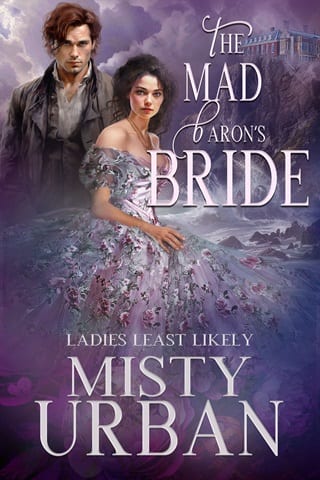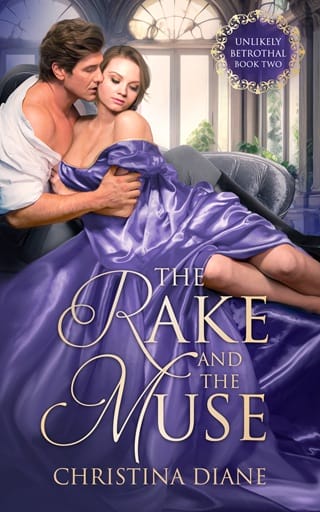Chapter 4
CHAPTER FOUR
I t was generally Leda's ambition to be no more than sufficiently smart in her attire, as she wished to be found unobjectionable and in no way setting herself up as an example to be emulated. Yet she felt overly self-conscious of her fashion choices that morning as she walked down Milsom Street beside Lord Brancaster, with Lady Plume, who found the prospect of a walk over half a mile fatiguing, carried alongside in a sedan chair.
Leda had grown accustomed, in the years of her employment, to the different ways that tradesmen, peers, and passersby regarded a lady as compared to a common miss or mistress. Lady Plume's way was smoothed considerably by the aura of wealth and consequence she imparted. But that was nothing to the eminence by which a lord swept all before him.
Gentlemen who would have merely tipped their hats in a perfunctory greeting met Brancaster's eye and smiled with the shared, secret knowledge of men. Ladies bobbed their heads, dispensing smiles coy or serene. Misses colored and whispered behind their bonnets. Merchants came to their door to hover with inviting smiles. Boys tagged behind in the street, remarking on his riding whip, his spurs, the precise roll to the brim of his top hat.
And this was Bath, where, during the season, it was not uncommon to come across a duke, an earl or two, and any host of officers in uniform. In Norfolk, in what she supposed must be quite remote country, he would be worshipped as a lesser god.
He bore it well, nodding in return, touching the brim of his hat, answering the occasional "good day" and "how do." Leda was glad she had worn her spencer of buttercup cloth and, for her head, the capote with the wild poppies along the small brim, though she worried how much dust kicked up from the road would coat her muslin frock by the time they returned home.
She was glad also that Brancaster was courteous. It would go far in procuring him a wife.
"Bath is rather new," he remarked as they passed the Palladian edifices of Queen Square.
"Wood rebuilt Bath the way Augustus turned Rome from mud into marble," Lady Plume replied.
"In Bath stone, which is easier to cut than marble, and has that distinctive honey color," Brancaster said. "Found only in Somerset. Our carrstone is red, though it's also a limestone. There's a great chalk shelf running under Britain from here to Norfolk, some believe."
"Indeed," said Lady Plume, who was more interested in waving to her acquaintance and studying their dress.
"Why would you think so?" Leda asked, curious.
"Have you seen the hillside carvings in Wiltshire? That's chalk giving the horses their white coat. Same with the White Horse of Uffington and the Cerne Abbas giant. And we've chalk pits near my estate, very good for brick making, so very likely the ridge is contiguous."
Leda wondered how a lord knew anything about stone. How easily, too, he remarked these mythical sights. As a gentleman, he had the leisure and the means to travel wherever he wished. So he assumed the same privilege available to everyone, never mind that some people had salaries to earn and depended on the protection of others for their every last need, which left no room for whims and very little leisure.
For a moment—a moment only—Leda contemplated what advantages might be offered the wife of a lord. Travel in her own carriage. Pin money. The title of her ladyship, and the accompanying respect.
But she knew well what was demanded of a wife—at least, a gentleman's wife. The duties demanded of a lady would be compounded. Only the rare and fortunate woman achieved Lady Plume's combination of wealth and liberty as a widow. Leda lacked the fortune as well as the liberty, and one gambled on being a lord's wife, for the fate of the lord's widow rested all too often on the sufferance of the heir.
No, she was better off where she was: quiet as a mouse in her bolt hole in Bath, outside the notice of any feral cats that might be hunting her. She was safe here.
And she would keep Brancaster—Jack—safe from her as well.
"I've a package to send," Leda said as they turned into Westgate and neared the White Hart Inn. "Shall I meet up with you at the Pump Room?"
"We can wait." Brancaster watched her produce the packet she'd been carrying in her cloth bag, wrapped tightly in oiled brown paper.
"One of the orphans you're supporting, I suppose? Come along to the Pump Room when you're finished," Lady Plume said. "Brancaster must have his name in the book, so everyone will know he's arrived."
"My packet is worth more than five pounds, so I must register it, but I oughtn't be long."
"You do not fear being left on your own, Mrs. Wroth? Here's a busy place."
The White Hart was the oldest coaching inn in Bath, at the heart of the medieval borough, and the coach to Gloucestershire departed in half an hour, with all the attendant bustle as ostlers readied horses and passengers readied themselves. Leda blinked at him.
"I am quite accustomed to being on my own, Lord Brancaster."
"I wish you would call me Jack."
"On no account will I assume such familiarity, sir. It would hardly be proper."
He drew nearer, his gray eyes lightening as his gaze touched each feature of her face. His look was as warm as a candle.
"I confess," he murmured, "the word I associate with you is not proper ."
Her breath caught in her throat. "What vocabulary would you employ?"
He sketched a brief bow. "I will divulge that at another time. I await your company, madame. Something tells me I shall need you to navigate this place."
"I expect you will do sufficiently well on your own."
"But my own company cannot possibly yield the same pleasure. Adieu for now."
Lady Plume emerged from her chair, deciding she could brave the short distance to the Abbey Churchyard, particularly since many of her acquaintance were converging on the same point. Her ladyship took little interest in Leda's errands, so long as her companion was available to her when she wished, but Leda feared Brancaster had seen the address written in her bold hand on the front: Tytherton Kellaways.
But that could mean nothing to him, as it would mean nothing to Lady Plume should he remark on it. Only Leda knew what the place meant.
Her nerves were stretched thin as thread on a spindle, so perhaps that accounted for the trick her imagination played. Emerging from the coffee room of the inn was a man she hadn't seen in eight years. A man she had hoped never to see again.
A man she'd been certain she'd never see again, because she'd killed him.
Leda nearly dropped her package in the yard, where the dirt had been churned to mud with the passage of hooves, feet, and roaming dogs. A hen in a cage, waiting to be loaded atop the next coach, screeched and fluttered its wings. Leda's insides did the same.
That hair, slick as oil. That dark brow and long nose, the small eyes with their heavy lids, the pink lips puckered in perpetual distaste. That visage was burned into her memories, into her deepest fears. Her skin went cold with apprehension.
He turned toward Union Street, away from the Roman Baths, and Leda rushed to the counter inside to lose herself in what small crowd she could find.
He could not be here. He could not . For if he were alive and recognized her, her freedom was at an end.
In a shaking voice, Leda required pen and ink of the agent coordinating the mail, and for an excessive sum, he rendered them. Her hands shaking just as badly, Leda opened her package and scrawled a quick note inside, a desperate question, a plea. The two people who could help her were in as much danger as Leda if their secret were discovered.
Her ears rang with the buzz of wasps as she stepped into the Pump Room. Light falling through the far windows blinded her momentarily. The high ceilings dwarfed the occupants of the room, the noise of conversation a gentle susurration no stronger, or more important, than the lapping of the baths next door in their concrete basin.
Gentlemen clustered around papers, discussing news of riots and sailing ships and war, while ladies promenaded, striving to engage the attention of the gentlemen. Someone's dog rushed past, yipping, while a small tiger in livery and a riding whip tried to clear a path for a servant pushing a Bath chair containing a master whose affliction, one would guess at the sight of him, was gout. From his alcove high in the wall the statue of Beau Nash smiled down upon what he had wrought, and his marble smile said he found it good.
The man, the black shadow, could step inside any moment. Everyone came here, the newly arrived to make themselves known, those settled for the season to survey the new arrivals. He would come and he would see Leda and he would—what?
What power could a dead man have over her?
He would know that Caledonia Toplady had not died as they'd been told.
He would ask what else she had lied about.
He would ask where the child was.
"Mrs. Wroth. Are you quite well?"
The words filtered through her fog but didn't register as belonging to her. A form loomed in the corner of her eye, and out of instinct she shrank away.
"Leda," a voice said quietly, and she turned toward it.
Brancaster, so splendidly solid, like a wall that could keep back the dark. She blinked and focused on his steady eyes, his concerned frown.
"Forgive me. You seemed very far away."
He held out an arm to her, and she took it.
That was a mistake, for once she had him, a steady support, she did not want to let him go.
"What has upset you?"
She forced her lips to move. "Did you write your name in the book?"
"Yes, I?—"
"I want to see." Leda fairly dragged him toward the register on its small table. The newest signers moved away, slow as treacle, and she peered at the list of names. Ink danced before her eyes.
"The Duchess of Gordon is in town." Lady Plume gave Leda a start, showing up at her shoulder. "It's been an age since I saw Jane. I do hope she's not ill—that would be such a shame. She was looking forward to leisure once she had all her daughters married."
"Be advised that is your one duty as a parent, milord," Leda said, her voice hollow in her ears. "Raise the girl to be married."
He raised his brows. There was something wicked in the gesture, and her stomach curled in on itself. Perhaps she ought to have eaten that second slice of toast.
"The philosophy of your parents, I take it?"
"And your wife's parents also, I am sure."
"So it was." His jaw set, and he looked out over the small crowd assembled in the Pump Room, but his gaze was distant. "Yet I suspect that was not her goal for herself."
It was not here, the name she dreaded to see. But that did not mean he was not in town. It could mean he had only just arrived and had not yet signed the register.
It could mean he might enter the room at any moment. Would he recognize her, after all this time?
What man would not recognize the woman convicted of his murder?
She pulled Brancaster away from the ledger, her fingers digging into his arm with unnecessary tension. "Tell me more about the qualities you desire in a wife. The next to hold that privilege may well be in this room."
"The qualities I wish in a governess, you mean."
"I thought I persuaded you a wife was the better bargain. All that labor, and for free."
"Rather your comments persuaded me that wifehood must be the most dreaded and overworked status in the kingdom, and no sane woman would willingly lash herself to that mast without the greatest inducement."
"You forget what an inducement bed and board can be, all on its own," Leda answered. "And a companion who cannot be objectionable—or so I assume," she added hastily, realizing she had said too much.
He didn't miss a thing, drat the man. His brows lifted. "You find me unobjectionable?"
"I am assuming the perspective of the dainty young maiden who will become your wife, and presuming she would not find you so." She turned to survey the crowd about them.
"Who said I would wish for a maiden?" he murmured.
"Every man does. Come, here are Sir Charles and Miss Hotham, whom you slighted last night, and may now repair the breach."
Leda stepped forward, and he stepped with her, as if they were a matched pair and had been in harness together for years. He wore Eau de Cologne, and on him the notes that emerged were grapefruit and bergamot, with a hint of tobacco.
A wall of longing hit Leda in the face. The faint scent of tobacco took her back to her father's study, one of her favorite places in the world, once her shelter and escape.
She had no refuge now. Only this tiny space in Bath where she crouched like a child closing her eyes in a game of hide and seek, praying she wouldn't be found.
"Sir Charles, good morn. How are you finding the waters today?" A sulfurous odor drifted from his cup, dispensed to him by the matron behind the wooden bar at one side of the room. "Miss Hotham, I hope you enjoyed the assembly last night. Lord Brancaster had already engaged my hand for the minuet or I would not have bustled away from you so hastily."
Leda made quick introductions. Sir Charles's brow worked while Miss Hotham regarded Brancaster, a blush rising on her cheeks. She could not seem to decide how deeply to curtsey.
"Miss Hotham, I detect that your days in the schoolroom passed under the tutelage of a wise governess. Would you be willing to share the name of your friend? His lordship is in search of a proper person to instruct his charge." She pulled her lips into a smile. "Though I have counseled him that he might instead seek a wife."
Miss Hotham turned scarlet.
"Brancaster!" Sir Charles's brow cleared. "The Mad Baron, eh? 'Swhat Howth called you. Rowdy good story there, I'd imagine?"
"Not at all." Brancaster's voice was as smooth as melted butter, but his arm beneath Leda's hand felt like a catapult primed to spring. "Too much time walking the cliffside with one's thoughts will lead a man's friends to call him mad, and style themselves wits for it."
Sir Charles looked disappointed that a salacious tale was not in the offing. Meanwhile, Brancaster regarded Miss Hotham with no more interest than he had regarded his cutlery at breakfast; there was need to interact in socially acceptable manner, and that was all. He seemed unmoved by the delicate slope of her nose or the susceptible fairness of her skin.
Leda wondered why she felt faintly smug about his lack of interest in the girl.
Miss Hotham appeared desperate to remedy this. Her fan fluttered. "I find madness very poetic. Like in Mr. Wordsworth's Lyrical Ballads ."
"Your governess had a romantical interest, then?" Leda asked, determined to set the conversation on its proper course.
More blushes painted Miss Hotham's sweetly curved cheek. "Oh, no, my mother oversaw my education, mum."
"Ah, a pity, as I imagine she is not eligible for either of your open positions, your lordship," Leda teased Brancaster. "Would you care to walk with Miss Hotham about the room and hear more about her education? Sir Charles might take me to get my daily dose of the waters."
"Now see here, Mrs. Wroth, I won't have you pitching my daughter at the Mad Baron," Sir Charles chortled. "I know your reputation as a matchmaker."
"I had thought her a match unmaker, rather," Jack murmured.
"A red coat's good enough for my gel, should there be a government pension behind it," Sir Charles said. "Look you, there's Captain Handfield below the statue. Come and I'll introduce you, El." He nodded to Jack, then Leda, and towed his daughter away.
"Are you going to encounter that reception often?" Leda considered the knight's departing form and Miss Hotham's wistful glance in Jack's direction.
"I fear so," Brancaster answered, his jaw etched in hard lines.
"Perhaps you'd best tell me why people call you mad."
"I'm sure I cannot say."
She tugged him into a promenade with her so he did not stand there like one of the Corinthian pillars of the colonnade, sturdy, strong, imposing. She brushed aside the observation that he was the ideal height for her to twine her arm in his and walk comfortably.
She could make no sense of him. The men used his sobriquet to poke fun. They didn't fear Brancaster's madness, whatever strain it was presumed to be.
But they wouldn't marry their daughters to him, either.
"Will you make me resort to consulting Lady Plume? I have yet to sort out that line of relationship. Never say you inherited a family strain of madness from her, for I have seen no sign of disordered wits. She never even has the vapors."
"She is a great-aunt, and my grandfather was her youngest brother. I do not think they were close, but Lady Plume has kindly taken an interest in my branch of the family, which none of my other relations, aside from Aunt Dinah, have proven eager to do."
"Because of your reputation, or because of something else?"
He looked at her bleakly. "Can a man ever be separated from his reputation?"
"Yes, if the grounds of accusation are false."
She waited for explanation, which was not forthcoming. There was some basis to the claims of madness, then. But what?
False shadows and old scores, as had been the case with her?
Not that she was about to tell him they shared that taint.
She turned to survey the room of its female population, identifiable by the many varied ornaments in their hair. A young maid would not do for Brancaster, so it would appear. He required a woman of experience, of developed character and steady mind, one inured to gossip and bandied words. A comely widow, or a maid of advancing years, someone who would not be shocked by a man's occasional eccentricities. A sensible sort who would provide a gentle guiding hand for his daughter, a thrifty eye on the running of his house, and companionship for himself on gloomy afternoons when the cliffsides were no good for walking.
Such women existed all over, in droves. She could present a handful of them to Brancaster before the morning was out. She tugged his arm to draw his attention to the first one, and when he turned to her a sudden vision soared into her mind, driving out thought and sense.
Brancaster, across the breakfast table, sliding her the morning paper with that look of warm attention, that small smile upon his well-defined lips as she handed him his toast, buttered just as she knew he liked it.
She felt off balance, like she'd stepped into a punt on the river. She'd never known domestic tranquility for herself, not until she found Miss Gregoire's here in Bath, and she'd certainly never imagined male companionship for her future. Not of the sort that shared breakfast after sharing a bed.
The mineral scents of the waters must be addling her brain. Sharing beds, indeed. She received her fair share of subtle hints and invitations, as a widow still in possession of her looks, but nothing yet to tempt her.
Not until Brancaster, with that look in his fog-gray eyes, that lock of caramel hair curling over a jutting brow, that precise slope to his jaw and his scent of citrus and the way his gloved hand left a brand on her back as he steered her in a circle in the minuet, causing all her breath to fight its way up her chest.
Good heavens, it was time to bring her thoughts in order. She'd been off her stride since the White Hart, and no surprise. "I believe it is time to introduce?—"
"Mrs. Wroth. Infernal gossip and peddler of lies."
A man bore down on her, a tower of indignation. Every part of him trembled, from the tight curls sprouting about his red face to the ribbons dangling from the knees of his breeches. A double row of buttons studded a tight coat with a high stand-fall collar and tails cutaway over a crimson waistcoat lined with smaller buttons, all of them quivering with the force of his indignation. He loomed before Leda, looking down at her beneath the brim of a tall, conical black hat.
"You—you harpy. "
"Here now," Brancaster said sharply. "I'm sure that's uncalled for."
"You turned her off me. Told I was insolvent. Told her lies ."
"I never lie," Leda lied. "Brancaster, this is Mr. Crutch, lately of Warminster. Mr. Crutch, Baron Brancaster of Holme Hall."
"She was sweet on me." Crutch ignored his lordship to glare at Leda. Beneath her fingers, Brancaster's arm tensed, drawing her closer to him. The action seemed instinctive. "Sweet, and you turned her sour."
"Mr. Crutch, I am sure any suit you press will rise or fall on the merits of your own self," Leda replied. "If Mrs. Limpet has changed in her preferences or inclinations, that is within a woman's prerogative to do."
"You're a wrecker." Crutch gripped his walking stick and continued glaring. "You find perfectly happy people, with happy hopes and prospects, and you—you destroy them."
"I do no such thing," Leda snapped. She had made her mission in life—her new, reclaimed life, at least—to help women find freedom and purpose, relief from persecution, encouragement to follow the paths that would best funnel them to their dreams.
She did not destroy. And she paid penance every day for the destruction she had done.
"I have not yet had my cup," Brancaster announced, "and neither have you, Mrs. Wroth. Crutch, is it? Good day." He steered around the irate bachelor as if he were a goat in a farm lane.
Leda made the mistake of glancing behind. Crutch had, predictably, turned to deliver a fulminating glare.
He could seriously damage her reputation with his accusations that she had meddled and manipulated. Her name came to lips as the soul of absolute discretion. Those who sought her advice or fixes did so with the promise that their difficulty would be solved with the utmost quiet and lack of fuss.
If Leda lost the trust of the people who came to her, she would not lose income, true. But as a conventional lady's companion, overlooked and unremarked, she would be a deal less interesting to Lady Plume, and there lay all her security.
"Do all your unmatched take it so poorly?" Brancaster asked, holding her arm close to his body. A distracting heat arose from him, hotter than the waters of the spring pouring beneath their feet.
Leda couldn't respond. Her lungs seized when she saw a shadow slip through the tall doors, pass through the morning light slanting on the floor. Greasy black hair. Small, close-set eyes. The black stock at his throat, as if he were a military man or religious. As if he had the authority and discipline of either.
A cold, quivering sensation wound up her body from her feet, as if she'd stepped into an enormous chilled pudding, and she was drowning.
He was here .
"Do you know, I believe I might dispense with my daily dose today." Leda was astonished that her throat worked to form words, which moreover sounded perfectly sensible, when her senses had taken flight like a screaming hen. "There is so much more to see in town, Brancaster. Let us find your new lady somewhere else."
She had to get him out of here. She had to find him a governess and send him off packing before the ghosts grew any closer, before there were any chance he might learn who Leda was, before Lady Plume learned.
Bath had been her refuge for six years, where she clung like a red squirrel in its tree. Now the kite was on the loose, hunting with his keen eyes, and that refuge would disappear. Where could she go next? Where would she be safe?
Nowhere will be safe for you, if you leave me .
He'd sworn that, hadn't he? Made her a promise. And now he meant to keep it, even from beyond the grave.
 Fullepub
Fullepub 



